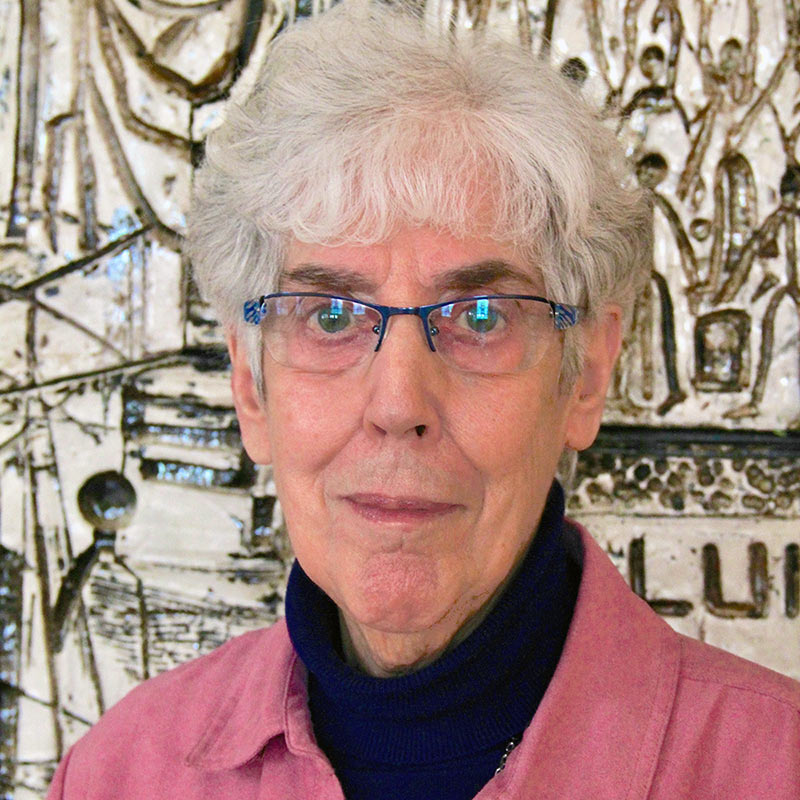The Visitation: Women of Faith, Hope and Vision Meet
Photo: Marie-Claire Dugas
Read: The Visitation: Lk 1:39-56
Mary, as Servant of the Lord, influenced by the Spirit, hastens to visit Elizabeth, her cousin. Saint Ambrose of Milan says that Mary went with haste because inspirations of the Holy Spirit cannot be delayed.[i] Luke shows in his Visitation narrative then that God’s visitation to Mary and God’s Word planted within her womb are experiences to be communicated and shared with another person.
Luke does not tell us what Mary says as she enters Elizabeth’s home. He focuses on her reaction to the sound of Mary’s voice. Elizabeth, touching her experience of the joy-filled movement of the child in her own womb, cries out to Mary, “Blessed are you among women” (Lk 1:42). [ii]
Elizabeth in naming Mary “blessed” affirms and deepens Gabriel’s having addressed Mary as “favoured” – already transformed by God’s grace. In so doing, she also affirms that Mary has been filled with grace for a new mission – the bringing forth of new life, Jesus, Emmanuel, God with us.
Luke puts a post-resurrection understanding of Jesus on Elizabeth’s lips, showing that she recognizes who Jesus is from his conception. She also affirms Mary is the ideal disciple, calling her blessed because she believed that what the Lord told her would be fulfilled. Later, Jesus acknowledges that his mother is blessed because she heard God’s word and acted upon it (Lk 11:29).
- How does reflecting on and listening to God’s word influence your/my life day-by-day?
The Visitation: Model of Genuine Human Encounter
Beyond Luke’s use of the narrative for his own theological purposes, the meeting of Mary and Elizabeth points out the importance of genuine human encounter. It is not difficult to imagine Mary’s need to be near someone who is also pregnant and understands the changes she has begun to experience. Her unique pregnancy placed her in a precarious situation – open to suspicion and accusation by the people around her. It would be natural for Mary to turn for understanding to Elizabeth, who likely had known years of shame and disgrace because of her inability to conceive. Elizabeth would also have needed Mary for support during this time.
Living under Roman oppression and rigid patriarchal, religious attitudes towards women, Mary and Elizabeth witness to us that “God is able to bring holiness and good even from the most apparently shameful situations…. The incarnational God is to be found in the midst of the messiness of painful human plights.”[iii]
In our times, faced with warring nations in parts of the world, systemic racism, the Covid-19 Pandemic, is the Spirit of the incarnational God not present in various movements for justice and equality for all? On daily news, we hear about many efforts people are making to listen to others, to bridge differences – neighbours helping neighbours, ensuring social distancing, wearing masks to stop the spread of the virus. We hear many stories of people using available technology to connect to others to communicate their needs, their fear, anger, hope, compassion, joy.
Is this not also a sign of the presence of the Spirit of a compassionate God?
- So where do you/I see the Spirit of a compassionate God active in your/my situation?
According to the scriptures, Mary stayed with Elizabeth for three months. Using our imaginations, we can visualize both women in ordinary daily activities – washing, cleaning, cooking, fetching water at the well, conversing with the people in the village, and talking about the children growing in their wombs. See these pregnant woman – attentive to life stirring within – encouraging each other, questioning what difference these children would make in their lives, and returning often to the call to trust that “nothing will be impossible with God” (Lk 1:37). Two pregnant women – open, attentive, and receptive to the Spirit’s action in their lives – recognize that God has visited both of them. This is the heart of visitation – encounters between two persons, who each walk away conscious of the unique mystery within.
Johannes Metz wrote: True visitation comes from the inside out. For this to happen we must first appreciate our own uniqueness. Secure in ourselves we can then forget ourselves, to allow another to approach us, to let their distinctive personality unfold, even though it can frighten or repel us.”[iv]
- Pondering Mary’s and Elizabeth’s encounter, are there experiences when, in conversation with another, you/I have felt life stir deep within because two people, in truly meeting one another, have called forth all that is good in each other?
- How did this experience affect your/my life?
In the meeting of Mary and Elizabeth, we also find the true meaning of mutuality: people working together, recognizing and valuing the other, acknowledging the unique call of each person and the important contribution each can make to the task to be accomplished. When a spirit of mutuality prevails, no one tries to outdo the other. In such a climate, interdependence, people sharing and building upon one another’s strengths and insights and reciprocity, respect for the other person, can flourish.
- What message in the above text gives meaning to your/my life at this moment?
[i] https://www.crossroadsinitiative.com/saints/Marysvisitationofelizabeth/. Accessed November, 2015.
[ii] Mandala: The Visitation, Rachel Gaudreau, CND, ©2015.
[iii] Barbara Reid, Choosing the Better Part, Women in the Gospel of Luke, MN: The Liturgical Press, 1996, pp. 84, 85.
[iv] Johannes B. Metz, Poverty of Spirit, New York: Paulist Press, 1968, p. 45.
